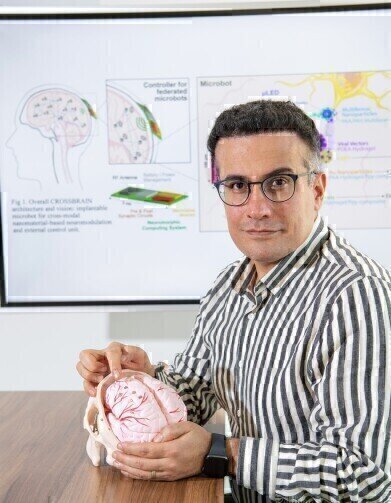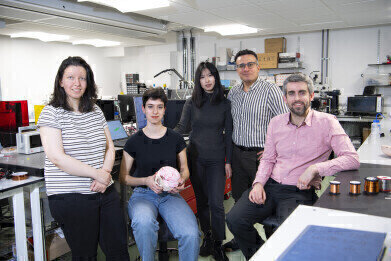-
 Professor Hadi Heidari (Credit: University of Glasgow)
Professor Hadi Heidari (Credit: University of Glasgow) -
 CROSSBRAIN team (Credit: University of Glasgow)
CROSSBRAIN team (Credit: University of Glasgow)
News
Advanced Nanomaterials enhance potential for Microbot Brain Modulation
Feb 16 2023
An international project led by PI Professor Nicola Toschi, Department of Biomedicine and Prevention at the Tor Vergata University of Rome, Italy and including University of Glasgow researchers is set to develop tiny injectable robots capable of predicting and mitigating epileptic seizures.
The four year CROSSBRAIN project, funded by the European Innovation Council, aims to use implantable ‘microbots’, about a tenth of a millimetre in size and made from advanced nanomaterials, to ultimately deliver genetic material on command, enabling cell and microcircuit-level neuromodulation in rodent brains, during the later stages of the project.
The microbots will be controlled by a small, wearable central control unit capable of monitoring electrical activity to detect the onset of a seizure and modulate its effect through targeted neurostimulation.
Professor Hadi Heidari, of the University of Glasgow’s James Watt School of Engineering and project lead of the UK contribution to CROSSBRAIN, will be working on integrated micro and nanoelectronics design, to develop the microbots’ wireless power and data management and delivery systems, with a focus on developing FBAR magnetoelectric antenna.
“We’re pleased to be part of this ambitious project, which has the potential to pave the way for transformative treatments for pathological brain conditions like epilepsy,” Professor Heidari said. “CROSSBRAIN brings together leading researchers from across Europe, with a wide range of expertise in bioengineering, artificial intelligence, nanomaterial design and fabrication, and medical physics. I’m looking forward to collaborating with my colleagues to develop this exciting technology in the years to come.”
Collaborating in the UK CROSSBRAIN team are Dr Rupam Das, of the University of Exeter, Dr Finlay Walton, Mahdieh Shojaei Baghini, Jungang Zhang and Laura Mazon Maldonado. Professor Muhammad Imran, director of the University of Glasgow’s Communications, Sensing and Imaging Hub, will also lend support on wireless power and data transmission.
Professor Heidari added: “Within brain tissue, neurons communicate through a complex interplay of signaling mechanisms, including chemical, thermal, and electrical (depolarization/repolarization) changes. It is widely known that many pathological brain conditions directly involve aberrant electrical activity of the brain, such as, epileptic seizures or panic disorders.
"In such conditions, timely recognition and prompt intervention are essential to begin effective periodic and adaptive treatment. However, the technologies available to guide and modulate brain activity in a precise and selective way for therapeutic purposes are severely limited to date, considerably reducing the therapeutic options.
“The CROSSBRAIN project aims to create radically new neurostimulation strategies and devices in the field of precision medicine with a key role in the predictive management of brain diseases,” he concluded.
Other project partners include research teams from Italy, the Netherlands, Germany and Spain. CROSSBRAIN is funded by the EIC Pathfinder Challenge Grant, funded by the European Innovation Council (European Commission) under the Horizon Europe program.
More information online
Digital Edition
Lab Asia Dec 2025
December 2025
Chromatography Articles- Cutting-edge sample preparation tools help laboratories to stay ahead of the curveMass Spectrometry & Spectroscopy Articles- Unlocking the complexity of metabolomics: Pushi...
View all digital editions
Events
Jan 21 2026 Tokyo, Japan
Jan 28 2026 Tokyo, Japan
Jan 29 2026 New Delhi, India
Feb 07 2026 Boston, MA, USA
Asia Pharma Expo/Asia Lab Expo
Feb 12 2026 Dhaka, Bangladesh


















